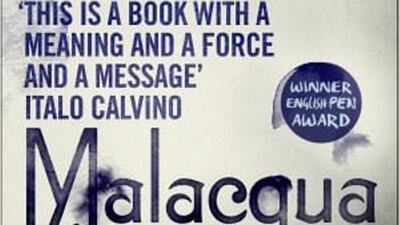Nicola Pugliese was an Italian journalist born in Milan, but who lived and worked for most of his life in the city of Naples. In 1977 his first and only novel, Malacqua, was published – by literary heavyweight Italo Calvino, no less. It was an immediate hit, selling out in a matter of days, but Pugliese – for reasons apparently unknown – demanded that it wasn't reprinted, so, despite its initial impressive success, the novel thereafter remained out of print, until Pugliese's death five years ago in 2012. As such, this new edition, gracefully translated from the Italian by Shaun Whiteside, is the first English language version, introducing new readers to a strikingly elegiac novel that will surely soon be hailed as a lost Italian classic.
A plot precis is somewhat unnecessary since the novel's own rather lengthy subtitle tells us everything we need to know: "Four days of rain in the city of Naples waiting for the occurrence of an extraordinary event." At about 3am on October 23 – the year isn't given, but we assume it's some time in the '70s – it starts to rain. It pours from the sky in "violent spates", thus, as the first light of the day breaks over the city, "a greyish dawn, sometimes violet in tone, resolutely pallid and funereal," the inhabitants of Naples wake to "a harsh and predetermined rancor, an irreversible obstinacy".
It doesn’t take long for the city’s infrastructure to start to break down under the deluge. Sinkholes appear, like great mouths yawning open in the ground, swallowing buildings, cars and people. Streetlights are blown and can’t be repaired as long as the water pours down in such quantities. The city sewers begin to swell and overflow, and even the seawater starts to rise, “its pressure mounting, and the waves swelled to smash against the moorings, and you would also have to say that on the second day it became clear, or rather people began to understand: perhaps this wasn’t the rain of other years, other months, perhaps this rain here was coming from a long way away”.
It’s a downpour of nothing less than Biblical proportions. Is the city experiencing a religious apocalypse? “Something major is happening here,” thinks a grocer as he watches buildings subsiding into streets gushing with “raging torrent[s]”.
So too, the narrative slips with a watery fluidity between various of the city’s residents – a journalist, a policeman, a fireman, a woman in the early days of a new romance, one who sells cigarettes for a living, to name but a few – each of them trapped within their own experience, the point of view cascading between the individual and collective with an ease reminiscent of the stream of consciousness technique demonstrated by writers in the early years of the 20th century.
Written when Italy was plagued by intensified political terrorism – that between the late 1960s and the early '80s, now referred to as Italy's "Years of Lead" (a reference to how many bullets were fired) – Malacqua can clearly be read as a product of its time, Pugliese using pathetic fallacy to great effect, transforming political unrest into meteorological tumult. Writing in the fabulist tradition, he combines fantastical elements – deep in the cellars of the Maschio Angioino, the old castle that houses the city's Baronial Hall, a doll that "emits superhuman voices and long heart-rending groans as though of multitudes," is discovered, its screams sending uneasy shivers down the spines of anyone who hears it; and 10-year-old girls across the city begin to hear music playing from five-lire coins – with the realism of a city and its people that he knew like the back of his own hand.
This isn't to say, however, that Malacqua is simply a period piece. On the contrary, one could actually argue that its republication couldn't be timelier. It has reappeared in an era increasingly threatened by a riotous and disordered natural world. It's only been a couple of months since we watched with horror as the flooding caused by Hurricane Harvey devastated Houston in the United States, while on the other side of the globe South Asia was hit by the worst floods in a century, decimating areas of Bangladesh, India and Nepal. Had it been written today, Malacqua would be read as an indictment of those politicians who refuse to countenance the existence of climate change and the dangers of global warming.
The citizens of Naples watch the destruction of their city waiting for an "extraordinary event" to bring things to a head; this, they suspect is "merely the start of the transformation". Whether or not their fears come true, readers can discover for themselves. What's not in doubt, however, is the extraordinariness of this is haunting, eerie novel.
______________________
Read more:
Book review: Celeste Ng pours fuel on the fire of social division in her acutely-observed novel
Book review: The bleakest season’s beauty laid bare in Karl Ove Knausgaard's Winter
Book review: 'Veil' is an effective reintroduction to questions about the veil
______________________

